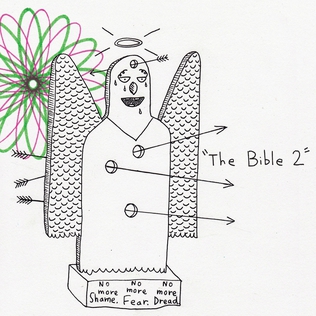The Bible 2: Sacrilegious or Saintly? 01/12/2018

Andrew Jackson Jihad. The name alone is enough to put you on the no-fly list, which is probably why they've elected to change their brand to the more friendly “AJJ”. They are a Phoenix based folk punk band, headed by singer/guitarist Sean Bonnette and Bassist Ben Gallaty. This ever-evolving group has a seemingly constant rotation of members, making for a unique sound every album. Their most recent release, The Bible 2, is no different. It tackles morality, social confusion, and dread, among other neurotic topics.
The album kicks off with some crunchy sounding guitars in Cody's Theme. It details the adventures of a violent child with rage issues, releasing his tension on trees and shopping carts. The yelping delivery on Sean's end makes for a great connection to the anger-riddled anxious youth he describes. If you hate his voice on this track, I don't recommend you continue listening! It's a staple of the band that some find annoying and whiny; however, it adds to the visceral subjects and lyricism Sean sings.
Cody's Theme is followed by Golden Eagle (about feeling incomplete) , Junkie Church (about loving an addict), and American Garbage (mostly about being confused and rude, kind of about Shoshanna from HBO's Girls). Among the more memorable songs were No More Shame, No More Fear, No More Dread. It continues the overarching story from the first track; he comes to terms with his anger, finding closure within himself. The following lyrics particularly highlight this change within him:
“Until all that I can do is beg for mercy
Nothing will survive in that despair
When something I hold dear is out to hurt me
I kick that feeble dream and whisper something like a prayer”
These lyrics are particularly poetic, unlike the previous lines in the songs before (i.e., “When I was a kid/ I was a total dick / To inanimate objects”). The somber piano gives this song an air of reflection, and is a definite change in pace from the jarring guitars that take up all the room in the last few tracks.
Goodbye, Oh Goodbye stomps on the touching moment with some more muddled production. The vocals waver through a messy soundscape, describing one living in an abusive or choking situation. Lyrics like “If I stay in bed long enough / They'll go to church without me” are resonant to many people; AJJ excels at this kind of human relatability to their audience. White Worms follows, a nonsensical tune with a callback to Journey's Don't Stop Believin'. The next song doesn't fare well either; My Brain is a Human Body is probably the most distorted track on the record, and not in a pleasant way. Luckily, AJJ saves it with Terrifyer, a punky song with complex bouncy melodies. They show off their writing prowess with personifying lyrics (“I saw beauty, spat in its eye / I saw the light, and all it saw was my phlegm”) and witticism (“Some days you're Emilio Estevez / Other days you're Charlie Sheen”) shrieked out in a violent clamor.
Possibly my favorite track on the record, Small Red Boy, concludes the story of Cody. It's a beautiful ballad in which the narrator gives birth to a devil child (seriously, just stick with me). He brings up the demon as his own, and when his “son” is fully grown, he transforms into a room with pictures of the narrator's memories on the walls. We slowly realize that that child was him all along, and was merely a conduit to accept his past. Finally, our narrator begins to form into his true self as he accepts the past, and he gives a final haunting cry at the climax of the song; “No more shame, no more fear, no more dread...I am the truth.” When I'm A Dead Boy is tacked onto the end, a subdued track that's, in short, a will and testament. It's a slow, barely-touched song, quiet yet evocative. Sean obviously wants to be remembered by his city, as seen in lines like “Pour a couple of my ashes in the concrete / Build a bench, 10 feet long, 12 inches tall / Leave it somewhere, central Phoenix / Where no security guards will dare try to protect it”. It doesn't continue the concept of Cody's story, unfortunately, but instead leaves the listener in a thoughtful fog.
In the end, I give The Bible 2 a 7 out of 10. It's an enjoyable release from a talented group of anxious adults. It's scrappy, sometimes too overbearing, but the songs that manage to balance the overdriven guitars with the lyrical content are worth it. It's a little upsetting that there isn't more lines connecting the metaphorical dots between Cody's story and the other tracks. Some might find the vocals too whining, the guitars too grating, or the lyrics too depressing. But overall, it's simply the antithesis of the clean-pressed bubblegum pop songs that we usually hear on the radio. It's beautifully, jarringly human; it's ugly, but somehow still relatable. It doesn't pander or make you feel particularly good, but reflects some dark emotions that we ignore or push down into our collective psyches until we don't feel them anymore.